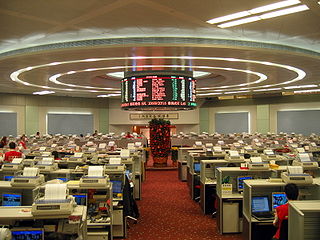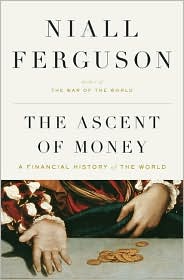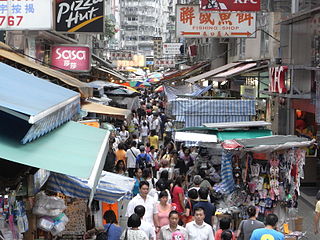
A stock market, equity market, or share market is the aggregation of buyers and sellers of stocks, which represent ownership claims on businesses; these may include securities listed on a public stock exchange, as well as stock that is only traded privately, such as shares of private companies which are sold to investors through equity crowdfunding platforms. Investment is usually made with an investment strategy in mind.

The Four Asian Tigers are the developed East Asian economies of Hong Kong, Singapore, South Korea, and Taiwan. Between the early 1960s and 1990s, they underwent rapid industrialization and maintained exceptionally high growth rates of more than 7 percent a year.

The Asian financial crisis was a period of financial crisis that gripped much of East Asia and Southeast Asia beginning in July 1997 and raised fears of a worldwide economic meltdown due to financial contagion. However, the recovery in 1998–1999 was rapid and worries of a meltdown subsided. The crisis started in Thailand on 2 July, with the financial collapse of the Thai baht after the Thai government was forced to float the baht due to lack of foreign currency to support its currency peg to the U.S. dollar. Capital flight ensued almost immediately, beginning an international chain reaction. At the time, Thailand had acquired a burden of foreign debt. As the crisis spread, most of Southeast Asia and later South Korea and Japan saw slumping currencies, devalued stock markets and other asset prices, and a precipitous rise in private debt.
The Hong Kong dollar is the official currency of the Hong Kong Special Administrative Region. It is subdivided into 100 cents or 1000 mils. The Hong Kong Monetary Authority is the monetary authority of Hong Kong and the Hong Kong dollar.

Black Monday is the name commonly given to the global, sudden, severe, and largely unexpected stock market crash on Monday, October 19, 1987. In Australia and New Zealand, the day is also referred to as Black Tuesday because of the time zone difference from other English-speaking countries. All of the twenty-three major world markets experienced a sharp decline in October 1987. When measured in United States dollars, eight markets declined by 20 to 29%, three by 30 to 39%, and three by more than 40%. The least affected was Austria while the most affected was Hong Kong with a drop of 45.8%. Out of twenty-three major industrial countries, nineteen had a decline greater than 20%. Worldwide losses were estimated at US$1.71 trillion. The severity of the crash sparked fears of extended economic instability or even a reprise of the Great Depression.

The Stock Exchange of Hong Kong is a stock exchange based in Hong Kong. As of the end of 2020, it has 2,538 listed companies with a combined market capitalization of HK$47 trillion. It is reported as the fastest growing stock exchange in Asia.
The Ting Hai effect, also known as the Adam Cheng effect, is a stock market phenomenon in which there is a sudden and unexplained drop in the stock market whenever a film or a television series starring Hong Kong actor Adam Cheng is released. It still remains as a popular topic among stock brokers, years after the television drama The Greed of Man was broadcast in Hong Kong in late 1992. The effect is named after Ting Hai, the primary antagonist in the drama, who was portrayed by Cheng.

The Greed of Man is a Hong Kong television series first broadcast on TVB Jade in 1992. The story, spanning three decades from the 1970s to the 1990s in Hong Kong and Taiwan, addresses various social and financial phenomena of the times, from triad violence to corruption in the Hong Kong Stock Exchange. It featured a top roster cast, including veteran TVB actors Adam Cheng and Damian Lau and award-winning actor Sean Lau. The series is also well remembered for a Hong Kong stock market cultural phenomenon called the "Ting Hai effect". In 2022, the drama was selected as one of ten classic TVB dramas being honoured for a new Youku and TVB programme.

Sovereignty of Hong Kong was transferred from the United Kingdom to the People's Republic of China (PRC) at midnight on 1 July 1997. This event ended 156 years of British rule in the former colony. Hong Kong was established as a special administrative region of China (SAR) for 50 years, maintaining its own economic and governing systems from those of mainland China during this time, although influence from the central government in Beijing increased after the passing of the Hong Kong national security law in 2020.

Hong Kong Exchanges and Clearing Limited operates a range of equity, commodity, fixed income and currency markets through its wholly owned subsidiaries The Stock Exchange of Hong Kong Limited (SEHK), Hong Kong Futures Exchange Limited (HKFE) and London Metal Exchange (LME).

A financial centre (BE), financial center (AE), or financial hub, is a location with a concentration of participants in banking, asset management, insurance or financial markets with venues and supporting services for these activities to take place. Participants can include financial intermediaries, institutional investors, and issuers. Trading activity can take place on venues such as exchanges and involve clearing houses, although many transactions take place over-the-counter (OTC), that is directly between participants. Financial centres usually host companies that offer a wide range of financial services, for example relating to mergers and acquisitions, public offerings, or corporate actions; or which participate in other areas of finance, such as private equity, hedge funds, and reinsurance. Ancillary financial services include rating agencies, as well as provision of related professional services, particularly legal advice and accounting services.

The Securities and Futures Commission (SFC) of Hong Kong is the independent statutory body charged with regulating the securities and futures markets in Hong Kong. The SFC is responsible for fostering an orderly securities and futures markets, to protect investors and to help promote Hong Kong as an international financial centre and a key financial market in China. Even though it is considered to be a branch of the government, it is run independently under the authorisation of the laws relating to Securities and Futures.
The 1973–1974 stock market crash caused a bear market between January 1973 and December 1974. Affecting all the major stock markets in the world, particularly the United Kingdom, it was one of the worst stock market downturns since the Great Depression, the other being the financial crisis of 2007–2008. The crash came after the collapse of the Bretton Woods system over the previous two years, with the associated 'Nixon Shock' and United States dollar devaluation under the Smithsonian Agreement. It was compounded by the outbreak of the 1973 oil crisis in October of that year. It was a major event of the 1970s recession.

The Ascent of Money: A Financial History of the World is a 2008 book by then-Harvard professor Niall Ferguson, and an adapted television documentary for Channel 4 (UK) and PBS (US), which in 2009 won an International Emmy Award. It examines the long history of money, credit, and banking.
Stanley Shih Kuang Kwan was a Hong Kong banker best known for creating the Hang Seng Index. The Hang Sang Index opened on November 24, 1969.

Hong Kong–United Kingdom relations are the international relations between the post-colonial Hong Kong and the United Kingdom. Hong Kong was a British colony from 1841 to 1941 and again from 1945 to 1997 when sovereignty was handed over to China. UK policy towards Hong Kong is underpinned by its substantial commercial interests, and fulfilling obligation as the other signatory of Sino–British Joint Declaration on the future of Hong Kong, in addition to support Hong Kong's mini-constitution, the Basic Law, and in accordance with China's policy of observing "one country, two systems". Hong Kong is also home to roughly 2.9 million British nationals, 350,000 of which hold an active British passport, giving it one of the largest populations of British passport holders in the world behind only the Anglosphere Commonwealth realms and the United States.

Hawkers in Hong Kong are vendors of street food and inexpensive goods. They are found in urban areas and new towns alike, although certain districts such as Mong Kok, Sham Shui Po, and Kwun Tong are known for high concentrations of hawkers.
The 2015-2016 Chinese stock market turbulence began with the popping of the stock market bubble on 12 June 2015 and ended in early February 2016. A third of the value of A-shares on the Shanghai Stock Exchange was lost within one month of the event. Major aftershocks occurred around 27 July and 24 August's "Black Monday". By 8–9 July 2015, the Shanghai stock market had fallen 30 percent over three weeks as 1,400 companies, or more than half listed, filed for a trading halt in an attempt to prevent further losses. Values of Chinese stock markets continued to drop despite efforts by the government to reduce the fall. After three stable weeks the Shanghai index fell again on 24 August by 8.48 percent, marking the largest fall since 2007.











